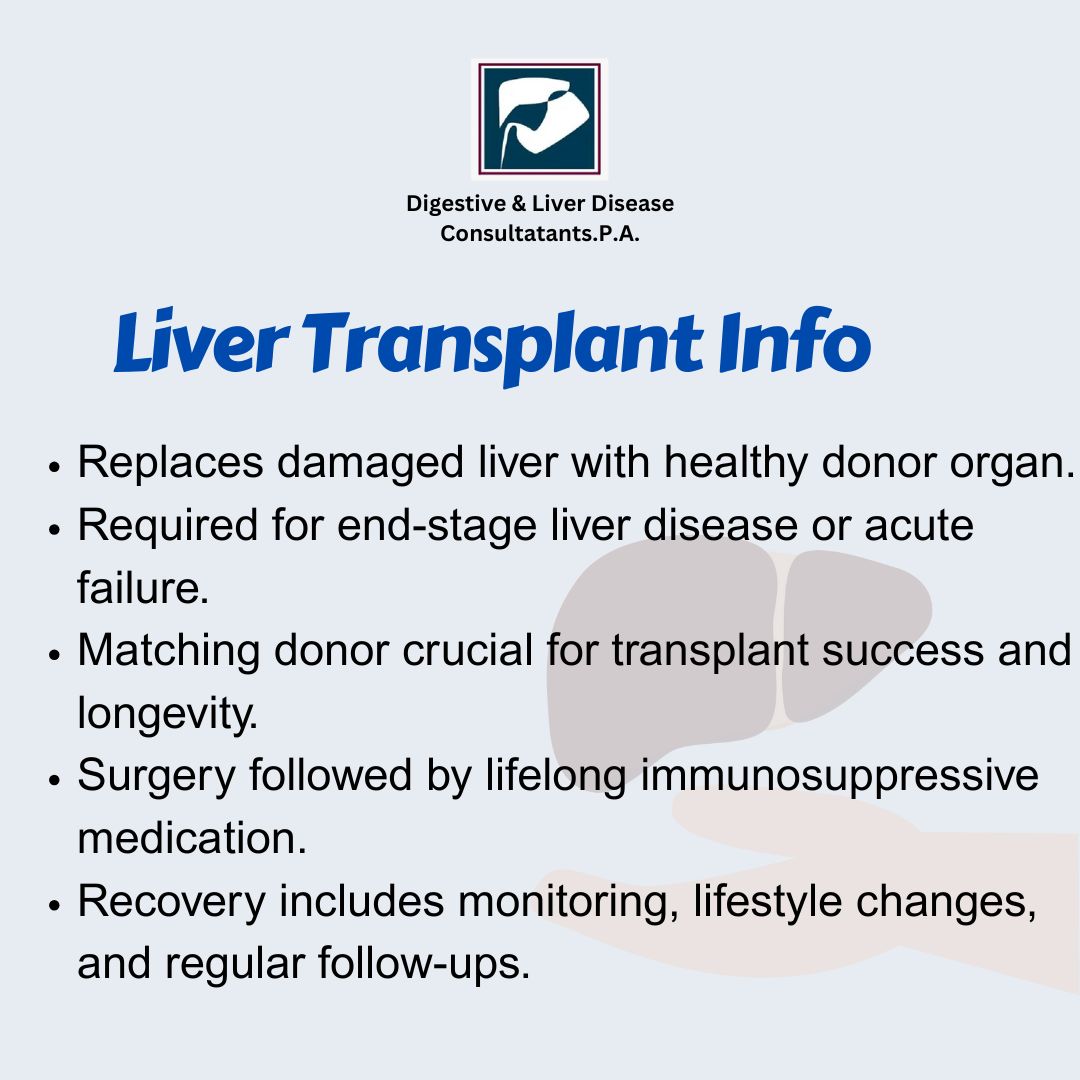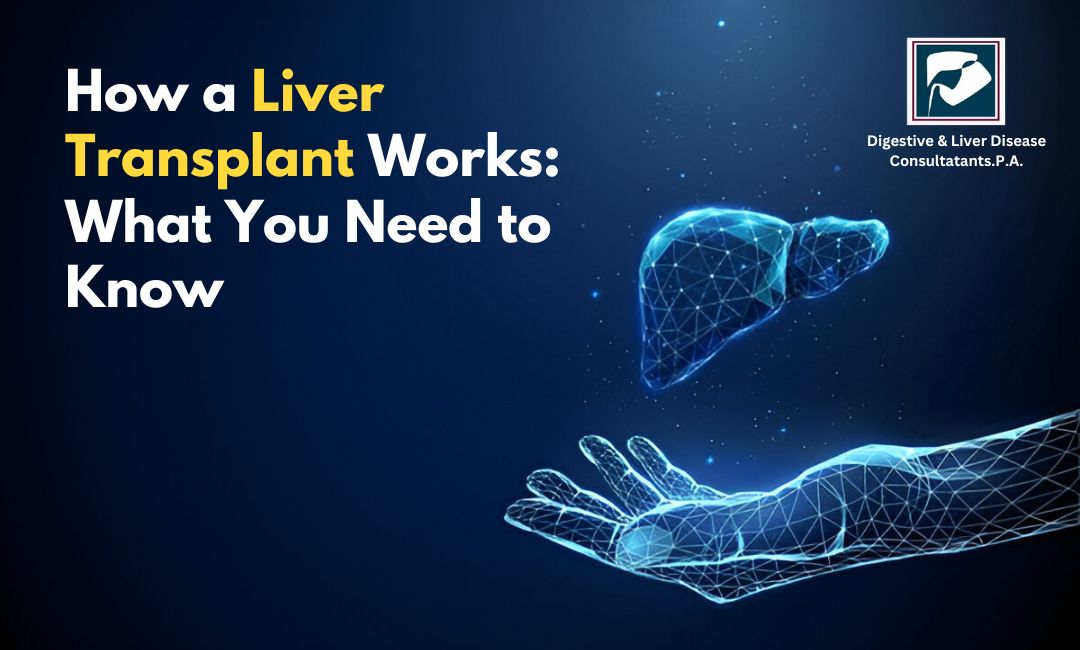A liver transplant can be a life-saving procedure for individuals with end-stage liver disease. If you or a loved one is considering this option, understanding the process and what to expect is important. At Digestive & Liver Disease Consultants, P.A., we specialize in the diagnosis, treatment, and care of patients with liver conditions. In this blog, we will walk you through how a liver transplant works, why it’s needed, and what the procedure entails.
What is a Liver Transplant?
A liver transplant is a surgical procedure in which a diseased or failing liver is replaced with a healthy liver from a donor. The liver is a vital organ responsible for many functions, including detoxifying harmful substances, producing bile for digestion, storing nutrients, and regulating blood clotting. When the liver is severely damaged or fails, a transplant may be the only option to save the patient’s life.
Liver transplant surgery is a complex and delicate procedure that requires careful planning, medical evaluation, and a well-coordinated healthcare team.
Why Might You Need a Liver Transplant?
A liver transplant is typically considered when a person has end-stage liver disease or liver failure that cannot be treated by other means. Several conditions may lead to liver failure, including:
- Chronic liver diseases such as cirrhosis, hepatitis, or fatty liver disease.
- Liver cancer (hepatocellular carcinoma).
- Acute liver failure from viral infections, toxins, or medications.
- Genetic disorders like hemochromatosis or Wilson’s disease.
- Alcoholic liver disease or other forms of liver damage caused by drug use.
When the liver can no longer perform its essential functions, and no other treatments are effective, a transplant may be the only option to ensure survival and improve quality of life.

The Process of Getting a Liver Transplant
The journey to a liver transplant involves several steps:
1. Evaluation and Assessment
The first step in the transplant process is a thorough evaluation. The healthcare team will assess your overall health, the condition of your liver, and determine if you are a suitable candidate for a transplant. This includes:
Medical tests: Blood tests, imaging scans (like CT or MRI), and liver function tests to evaluate the extent of liver damage.
Psychological evaluation: Liver transplant surgery is a major life event, and patients need to be emotionally prepared for the challenges ahead. A psychological evaluation ensures that patients understand the procedure and the lifestyle changes required.
Organ compatibility: A blood test will also determine the compatibility between you and potential liver donors.
2. Waiting for a Liver Donor
Once you are deemed eligible for a liver transplant, you will be placed on the transplant list. Because the number of available livers is limited, patients may wait for varying periods before a suitable donor is found.
Livers can come from either deceased donors or living donors:
Deceased donor: The liver is donated after a person has passed away, typically following brain death.
Living donor: In some cases, a living person can donate part of their liver. The liver has the ability to regenerate, so both the donor and recipient’s liver will grow back to normal size within a few months.
The transplant team will monitor your condition while you are on the waiting list. The amount of time you spend waiting will depend on factors such as your blood type, liver condition, and where you are located.
3. The Surgery
Once a suitable donor liver is available, the transplant surgery will be scheduled. The procedure is performed under general anesthesia, and the surgeon will remove the diseased liver and replace it with the donor liver. The surgery typically lasts between six to eight hours, depending on the complexity of the case.
During the surgery:
Removal of the diseased liver: The surgeon will carefully remove the damaged liver from the body.
Implantation of the donor liver: The donor liver will be connected to the blood vessels and bile ducts to restore proper blood flow and bile production.
After surgery, you will be closely monitored in the intensive care unit (ICU) for several days before being transferred to a regular hospital room.
4. Recovery and Rehabilitation
After a liver transplant, the recovery process can take several months. During this time, patients will need to be monitored closely for complications such as infection, organ rejection, or bile leakage.
Some key aspects of recovery include:
Medications: You will need to take immunosuppressive medications to prevent your body from rejecting the new liver. These medications must be taken for the rest of your life and require regular monitoring by your healthcare team.
Lifestyle changes: To protect your new liver, you will need to adopt a healthy lifestyle. This includes eating a balanced diet, avoiding alcohol, staying active, and attending regular follow-up appointments with your transplant team.
Emotional support: Coping with a major surgery and the challenges of recovery can be difficult, so emotional support is essential. It’s important to communicate with your healthcare team and loved ones to help you through the process.
Possible Risks and Complications
As with any major surgery, a liver transplant carries risks. Some potential risks include:
Rejection: Your immune system may attempt to reject the new liver, which is why immunosuppressive medications are critical.
Infection: Immunosuppressive drugs can increase the risk of infections, so you’ll need to take steps to protect your health.
Bile duct problems: There can be issues with bile flow after the transplant, which may require additional treatment.
Recurrence of liver disease: In some cases, the underlying liver disease may recur, especially if you had hepatitis or alcoholic liver disease.
Life After a Liver Transplant
With proper care, many liver transplant recipients lead healthy, active lives after surgery. The success rate for liver transplants has improved significantly over the years, and most people can expect to live for many years following their transplant.
The Role of Digestive & Liver Disease Consultants, P.A.
At Digestive & Liver Disease Consultants, P.A., we specialize in the treatment of liver diseases and offer expert care for patients who are candidates for liver transplantation. Our experienced team works closely with patients to evaluate their condition, discuss treatment options, and provide comprehensive post-transplant care. We are committed to helping you achieve the best possible outcome and improve your quality of life.
Conclusion
A liver transplant can be a life-saving procedure for patients with end-stage liver disease. While the process involves careful evaluation, waiting for a donor, and a challenging recovery period, the benefits of a successful transplant can be life-changing. If you or a loved one is dealing with liver disease, seeking expert care from a trusted medical team is crucial.
Experiencing liver problems or considering a transplant? Contact the specialists at Digestive & Liver Disease Consultants, P.A. for expert care and guidance.






